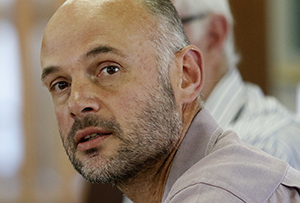Latest News Archive
Please select Category, Year, and then Month to display items
04 April 2024
|
Story Lunga Luthuli
|
Photo SUPPLIED
 Dr Juliet Kamwendo champions gender-inclusive climate action in Africa. Her expertise at the recently held AFR100 workshop highlighted vital steps towards sustainable and equitable development.
Dr Juliet Kamwendo champions gender-inclusive climate action in Africa. Her expertise at the recently held AFR100 workshop highlighted vital steps towards sustainable and equitable development.
Dr Juliet Kamwendo, Lecturer and Programme Director for Gender Studies in the Centre for Gender and Africa Studies at the University of the Free State, is spearheading efforts to integrate gender considerations into Africa's climate restoration agenda. Reflecting on her involvement, Dr Kamwendo stated, "This is particularly crucial, as women make up almost 50% of the population in Africa, and the depletion and degradation of land affect them disproportionately."
She recently served as a gender expert at the AUDA-NEPAD AFR100 workshop in Ouagadougou, Burkina Faso, from 25 to 29 March 2024. This initiative aims to restore forests and degraded land across Africa by 2030, with a focus on gender equality.
The workshop emphasised the integration of gender perspectives into the AFR100 project, acknowledging the disproportionate impact of land degradation on women. Dr Kamwendo's expertise highlighted the need to empower women in climate change interventions, addressing existing gender inequalities exacerbated by environmental degradation.
“Women – who are primarily responsible for household food security and water provision – bear the brunt of environmental degradation, leading to increased workloads, reduced income opportunities, and heightened vulnerability to climate-related disasters. Furthermore, the loss of forest cover and biodiversity further exacerbates the challenges faced by women, particularly in rural areas where they depend heavily on natural resources for their livelihoods,” added Dr Kamwendo.
Her participation highlights academia's crucial role in fostering inclusive and sustainable development, emphasising interdisciplinary collaboration to tackle complex environmental challenges. Through initiatives such as AFR100, stakeholders are working towards a more resilient and gender-responsive future for Africa.
Lecturer’s debut novel wins ATKV Prize for Fiction
2015-10-14

Dr Francois Smith
Photo: Johan Roux |
Kamphoer made its debut on the literary scene just over a year ago, and on 11 September 2015, it was declared the best novel by the Afrikaanse Taal en Kultuurvereniging (ATKV). This is not the first time Kamphoer has been recognised as literary gem. Earlier this year, the novel was shortlisted for the W A Hofmeyr Prize as well as the Huisgenoot Tempo Award.
Dr Francois Smith, the author, joined the University of the Free State (UFS) as a lecturer in the Department of Afrikaans and Dutch, German and French at the beginning of this year. Prior to entering the academic sphere, he dedicated about 11 years of his life to editing for a publishing house. Certainly, helping other people write and produce books thoroughly prepared him for authorship.
For three months, Smith spent eight hours a day creating his award-winning masterpiece. The secret of success lies in the ABC formula. “The ABC for writing is Apply Back to Chair. You have to go and sit down and start typing,” he says.
That is when passion meets imagination, albeit at times, one might also need inspiration. Smith applied this winning formula meticulously, and it has resulted in over 30 000 copies of Kamphoer being sold since July 2014.
He was taken aback by the novel’s warm reception. “I wrote a book, finished it, and knew that it wasn’t bad but I never for one moment imagined that it would be such a big commercial success,” he said.
About Kamphoer
The book which Smith describes as a good but not an easy read about a disturbing subject is the true story of a woman who was brutally raped during the South African War and left for dead. After the traumatic experience, she dedicates her life to helping others deal with similar ordeals, re-encountering her rapists in the process.
About the award
Kamphoer emerged as an exceptional contribution amongst two other finalists. Kerneels Breytenbach’s Ester as well as Harry Kalmer’s ’n Duisend stories oor Johannesburg were also competing for the prestigious award.